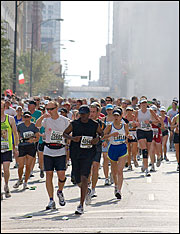
Chicago’s annual marathon was shut down early on Sunday due to oppressive heat and humidity, which led to dozens of hospitalizations. Grister Sarah Hardin was on the scene and offers this first-hand report:
—–
It’s become a tradition for my geographically widespread family to converge on Chicago in October for the city’s annual marathon. We’ve been volunteering at the marathon ever since my cousin married the operations manager for the event. This was the first year I was able to join in — and what a year, too. While 2006 saw 37-degree temperatures and cold rain all morning, this year’s runners experienced some of the hottest weather Chicago’s seen in October since the 1970s.
I witnessed up close and personal just how much planning goes into coordinating such a large-scale event (the race draws around 45,000 runners and 1.5 million spectators annually), and then I saw hundreds of people suffering from the effects of heat exhaustion, dehydration, and hyponatremia. Kudos to the marathon coordinators for making a difficult (and perhaps unpopular) decision to shut the course down and encourage people to reroute or walk the rest of it. It can’t be an easy task to convince stubborn marathoners to stop running.
The atypical October heat, and the general public’s lack of preparedness for it, was downright frightening. Grant Park was littered with exhausted, dehydrated, nauseated runners — and while the medical units were working hard to tend to everyone in need of care, it proved difficult to dispatch such widespread assistance. Chicago’s marathon is commonly known to be one of the best organized races in the world, if not the best; even so, it was simply impossible to extend resources smoothly on such a large scale.
This was just one race, on one hot day, but it seemed to indicate the need for better planning and preparedness at the city and state levels: We ought to seriously examine whether our systems and infrastructure are ready for environmental crises — because those crises sure don’t look like they’ll be ending any time soon.


